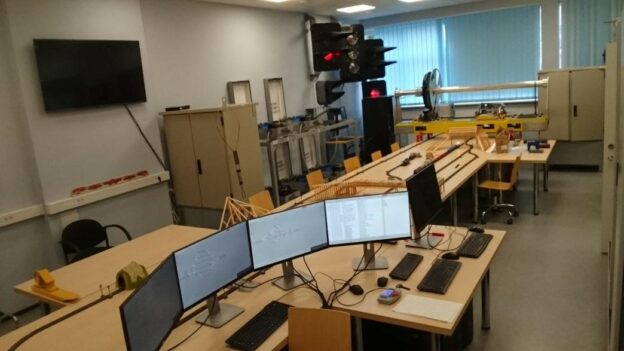DIGILOG Digitally supported and virtual study practices for modern logistic systems

Erasmus+ KA203 – Strategic Partnerships for higher education
Agreement number: 2018-KA203-06
Project period:
Start date: 01.09.2018
End date: 31.08.2021

Partners
TTK University of Applied Sciences (TTK UAS)
Häme University of Applied Sciences (HAMK)
Transport and telecommunication institute (lat. Transporta un sakaru institūts – TSI)
The Swedish National Road and Transport Research Institute (VTI)
The goal of the DIGILOG project was to develop a study module for use in professional higher education that focuses on transportation management and logistics. The idea was to develop a module that will provide future experts with the knowledge and skills required by a working environment which is becoming more multinational in character and is seeing the ever-increasing use of digital decision support systems and simulation tools. As transport networks in the EU, including the Baltic Sea region, are continually being harmonized and integrated, the content of the module considers and reflects best practices and developments.
The project worked out two intellectual outputs:
O1 – Virtual and open cross-institutional study module focusing on the digital environment of T&L systems;
Description of subjects belonging to the module
Materials 1-3
Materials 4-5
O2 – Simulation tool based on game strategy (TRELOGIC)
Materials for IO2
The subjects of the study module were selected by project partners, based on the needs of the industry. For selected subjects, Digilog study module subject cards were outlined.
TTK UAS led the development of:
• Supply chain management simulation (3 credits)
• Effective warehouse design and process simulation (3 credits)
HAMK led the development of:
• Passenger traffic railway markets are opening to competition, case of Finland (3 credits)
TSI led the development of:
• Professional Competence of Transport Managers (3 credits)
• Game based multi-criteria decision making for T&L competence development (3 credits).
VTI prepared a video exercise:
• Train driving exercise for train dispatchers (4 credits).
As rail seeks to maintain its environmental lead in transportation, in the framework of the study module, VTI has developed video exercises. The exercises help students to understand how train traffic and safety management issues are tackled in a realistic operational environment using simulation tools. The exercises will also support subjects developed by the other partners by building bridges with the other objectives of the DIGILOG project.
Priorities of the planned study module were the following:
1) Digitalization: The rapid development of digitally supported working practices has had a significant impact on performance in all sectors of the transport system in recent years, and this trend will continue in the future. The education of future graduates in transport and logistics must prepare them for work in a new digitally supported multinational working environment.
2) International approach: Connecting Europe is the main objective of the development of core transnational transport networks. The module meets this challenge – to educate and train experts prepared to work in multinational enterprises and teams.
3) Networking and cross-institutional study: To meet the above-mentioned challenges and provide students with the knowledge and experience necessary to work on an international level, professional higher education and training providers developed innovative e-learning methods and learning environments. The virtual study environment prepares graduates for work in other countries on multinational teams. Participation in courses at partner institutions enables to broaden the skills of these future experts. Module development was based on the Carpe Diem design methodology, which can be implemented virtually. Some study module subjects require face-to-face meetings in the classroom or lab. In that case, a student can apply for support through available student mobility programmes.
Module courses were designed using Carpe Diem approch – a team-based, student-centered e-learning design methodology. A design team first created a blueprint, which provides a general outline of the course, setting out goals and objectives, learning outcomes, and the manner of assessment, and then it drafted a storyboard representing the “student journey”, showing how lessons are actually carried out – how student time is spent, how resources are used, and how activities are incorporated. The course was tested and feedback was gathered to further refine the storyboard.
Carpe Diem learning design is an internationally well-known e-learning design model used around the world. It is a cooperative, team-based approach to the learning design and suitable to design or redesign the course, module, unit, or program. The idea behind Carpe Diem is competence-based and student-centered learning. (Salmon et al. 2020).
Target groups
• Students studying transportation and logistic
• Lecturers teaching transportation and logistics
• Research Academics in the areas of transportation and logistics (T&L)
• Other educational institutions
• T&L Engineering experts, specialists and professionals of transport-related companies and consultants
• Young people with fewer opportunities
Implementation of virtual institutional cross-study process
Following common principles for were outlined and accepted by partners:
• The project website displays implementation plans and registration instructions, as well as the necessary tools and contact information.
• Partners will agree on the courses offered per academic year.
• Students will ascertain the suitability of the studies to their study programmes at their respective universities or educational institutions.
Contact persons of the Digilog outcomes and future contact for study activities.
• TTK University of Applied Sciences – Oliver Kallas, oliver.kallas@tktk.ee
• HAMK – Häme University of Applied Sciences – Ville Turunen, ville.turunen@hamk.fi
• TSI -Transport and Telecommunication Institute – prof. Igor Kabashkin, kiv@tsi.lv
• VTI – The Swedish National Road and Transport Research Institute – DSc Birgitta Thorslund, birgitta.thorslund@vti.se



